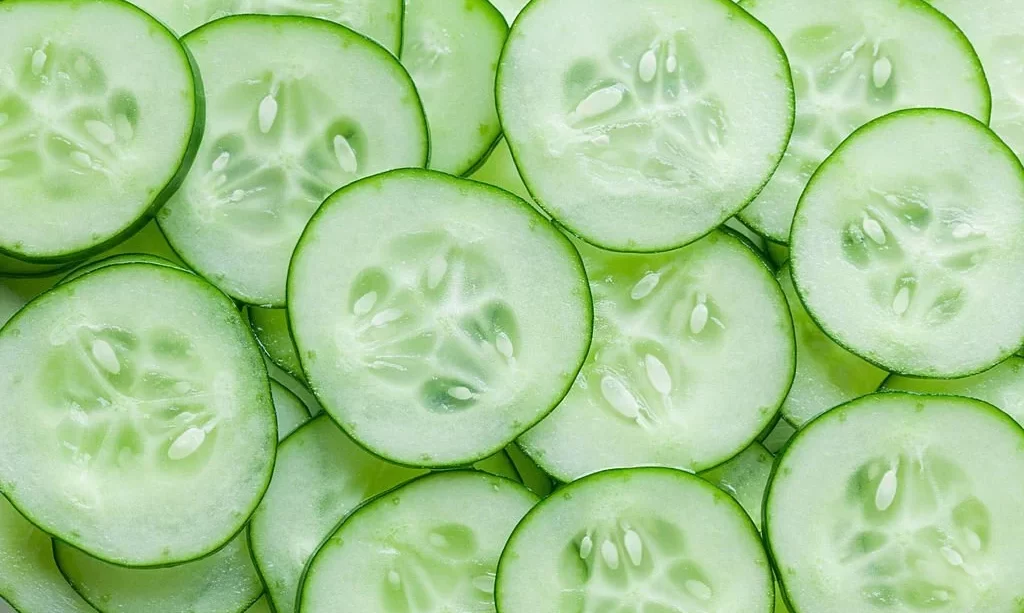Cucumbers, with their crisp and hydrating nature, are a staple in many diets, particularly during the scorching days of summer. These green wonders are often sliced, diced, or pickled, adding a refreshing crunch to salads and sandwiches. Yet, within the seemingly simple structure of a cucumber lies a question that occasionally piques the curiosity of those savoring this delightful vegetable: Can you eat cucumber seeds? As we embark on this culinary exploration, we’ll venture beyond the cucumber’s familiar facade to uncover the mysteries of its seeds. Are they edible, and if so, what nutritional treasures might they hold? Join us as we dissect the anatomy of a cucumber and dive into the world of its seeds to understand if they are a delicious addition to your culinary repertoire.
- 25 seeds
The Anatomy of a Cucumber
To comprehend the edible nature of cucumber seeds, it’s essential to grasp the intricacies of a cucumber’s structure. At its core, a cucumber is composed of several key components: the outer skin, the flesh or pulp, and the seeds. While the skin and flesh are the most commonly consumed parts of this vegetable, the seeds are an integral part of the cucumber’s reproductive system.
The cucumber’s outer skin is typically smooth and can range in color from dark green to a lighter shade, depending on the cucumber variety. This skin acts as a protective layer for the inner flesh and seeds, shielding them from the elements.
The flesh of a cucumber is what most people savor. It boasts a crisp and watery texture, making cucumbers a popular choice for staying hydrated on hot days. However, it’s the seeds concealed within the flesh that often prompt questions about their edibility.
The seeds of a cucumber are nestled within the central cavity of the fruit. They vary in size, with some being smaller and less conspicuous, while others are larger and more prominent. These seeds serve a vital botanical purpose, as they are essential for cucumber plant reproduction, allowing new cucumber plants to grow from them when planted in the soil.
As we delve deeper into the world of cucumber seeds, we will explore whether these tiny kernels are not only safe to eat but also a nutritious and flavorful addition to your culinary repertoire.
Are Cucumber Seeds Edible? The Short Answer
The short and sweet answer is yes, cucumber seeds are indeed edible. In fact, they are entirely safe to eat for most people. However, the edibility of cucumber seeds can vary depending on a few factors, including the cucumber variety and personal preference.
While cucumber seeds are edible, some individuals may choose to remove them before consuming the cucumber. This is often due to personal taste preferences, as cucumber seeds can vary in flavor and texture. Some people find cucumber seeds to be slightly bitter, while others enjoy the added crunch they bring to the overall cucumber experience.
It’s worth noting that the bitterness of cucumber seeds can be influenced by factors such as the cucumber’s maturity and growing conditions. Younger cucumbers typically have smaller and less bitter seeds, while older cucumbers may have larger and potentially more bitter seeds.
For those who embrace the idea of consuming cucumber seeds, they can provide a delightful crunch and a unique flavor profile that complements the mild, refreshing taste of the cucumber’s flesh. Whether you choose to eat them or remove them, the decision ultimately rests on your taste preferences and culinary creativity.
- The Straight Eight Cucumber receives its name by being best harvested when it reaches 8 inches long
- Use of this great slicing cucumber may result in jealous neighbors or friends and family arriving unannounced for dinner
Nutritional Value of Cucumber Seeds
Beyond their edibility, cucumber seeds offer a range of nutritional benefits. They are a source of several essential nutrients, including:
- Protein: Cucumber seeds contain protein, which is essential for building and repairing tissues in the body.
- Healthy Fats: These seeds provide healthy fats, including omega-3 and omega-6 fatty acids, which support heart and brain health.
- Fiber: Cucumber seeds are a source of dietary fiber, aiding in digestion and promoting feelings of fullness.
- Vitamins: They contain various vitamins, such as vitamin K, which is important for blood clotting, and vitamin B-complex, which plays a role in energy metabolism.
- Minerals: Cucumber seeds supply minerals like potassium, magnesium, and phosphorus, which are vital for various bodily functions.
Incorporating cucumber seeds into your diet can be a nutritious choice, particularly when combined with the cucumber’s flesh, which is hydrating and rich in vitamins and minerals. While cucumber seeds may not be a nutritional powerhouse on their own, they can contribute to the overall healthful qualities of this vegetable.
Taste and Texture of Cucumber Seeds
Cucumber seeds possess a taste and texture that can add depth to your culinary creations. The flavor of cucumber seeds is subtly nutty and can be mildly bitter in some instances, especially in older cucumbers. However, this bitterness is often subtle and not overpowering.
In terms of texture, cucumber seeds offer a delightful crunch that contrasts with the crisp and watery nature of the cucumber’s flesh. This textural interplay can be especially appealing in salads, providing an enjoyable contrast to the other ingredients.
The preference for eating or removing cucumber seeds largely depends on individual taste. Some may relish the additional texture and flavor they bring to dishes, while others may opt for a seedless experience. In either case, knowing that cucumber seeds are edible opens the door to culinary experimentation and the potential to create dishes that embrace the entirety of this versatile vegetable.
Culinary Uses of Cucumber Seeds
Cucumber seeds, with their unique flavor and crunch, can be a delightful addition to a variety of dishes. Here are some creative ways to incorporate cucumber seeds into your culinary endeavors:
- In Salads: Sprinkle cucumber seeds on top of salads for an extra layer of texture and flavor. They pair wonderfully with fresh greens, tomatoes, and cucumbers themselves, creating a refreshing and crunchy salad experience.
- In Smoothies: Blend cucumber seeds into your morning smoothie for added nutrition and a subtle nutty flavor. They can complement ingredients like yogurt, spinach, and fresh fruits.
- Pickling: If you enjoy pickled cucumbers, consider leaving the seeds intact when pickling. This can enhance the overall texture and flavor of the pickles.
- As a Garnish: Use cucumber seeds as a garnish for soups, stews, or even roasted vegetable dishes. Their crunchiness can elevate the presentation and taste of the dish.
- In Baked Goods: Experiment with adding ground cucumber seeds to baked goods like muffins, bread, or crackers for a unique twist and a boost of nutrition.
- Trail Mix: Combine cucumber seeds with nuts, dried fruits, and other seeds to create a homemade trail mix that’s both nutritious and satisfying.
Precautions and Considerations
While cucumber seeds are generally safe to eat and offer nutritional benefits, there are a few precautions and considerations to keep in mind:
- Bitterness: As mentioned earlier, some cucumber seeds can be bitter, particularly in older cucumbers. Taste a small seed before adding them to a dish to gauge their bitterness and decide whether to use them.
- Seed Removal: If you prefer a milder cucumber flavor or dislike the bitterness, consider removing the seeds by slicing the cucumber lengthwise and scraping them out with a spoon.
- Individual Allergies: As with any food, individuals with allergies or sensitivities should exercise caution when trying new ingredients. If you have known seed allergies, consult with a healthcare professional before incorporating cucumber seeds into your diet.
Conclusion: Savoring the Wholesome Goodness of Cucumber Seeds
In the world of culinary exploration, cucumber seeds offer an intriguing and nutritious avenue to savor the wholesome goodness of this versatile vegetable. Their subtle nutty flavor and satisfying crunch can enhance a variety of dishes, from salads to smoothies and beyond. Whether you choose to embrace cucumber seeds as a delightful addition to your culinary creations or opt for a seedless cucumber experience, the choice is yours.
Cucumber seeds, often overlooked, invite us to think beyond the familiar and embrace the culinary potential of every part of this beloved vegetable. As you embark on your culinary adventures, consider the edibility of cucumber seeds as a pathway to discovering new flavors and textures that can elevate your dishes to new heights.
So, the next time you encounter a cucumber, remember that the seeds within hold more than just botanical potential – they hold the promise of a delightful and nutritious culinary experience waiting to be savored. Whether in your garden or on your plate, cucumber seeds invite you to explore and celebrate the wholesome goodness they bring to your world of flavors.





